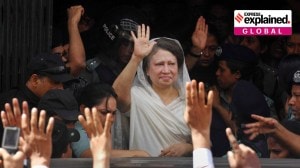Ideas Explained: Why India’s services sector needs urgent attention from the government
The Atmanirbhar Bharat Abhiyan package provides little relief to the services sector, write Geethanjali Nataraj and Rishika Singh.
 The standstill in activities is bound to have a knock-out effect on employment, production and the economy as a whole, Geethanjali Nataraj and Rishika Singh write. (Express Photo/File)
The standstill in activities is bound to have a knock-out effect on employment, production and the economy as a whole, Geethanjali Nataraj and Rishika Singh write. (Express Photo/File)The services sector has been a key driver of both the global and Indian economy over the last three decades. India’s growth story has been driven by services, which has a 55 per cent share in the economy.
Services exports have outperformed goods exports in recent years, due to which India’s share in the world’s commercial services exports has risen steadily over the past decade to reach 3.5 per cent in 2018 — twice the sector’s share in the world’s merchandise exports, 1.7 per cent.
However, IHS Markit India Services index reports that the services sector has been contracting for five consecutive months since March, with an index of 34.2. In PMI jargon, the 50-mark level separates expansion from contraction.
Given the uncertainty in the world market and the projected slowdown of developed economies by 8 per cent this year, India’s services-led growth has to depend mostly on the domestic economy.
But “have we done enough to revive the services sector?” ask Geethanjali Nataraj and Rishika Singh in their opinion piece in The Indian Express.
The Centre rolled out a whopping Rs 20.9 lakh crore stimulus package to pull the economy out from the ravages of the pandemic.
“While the package is a beam of hope for some, it has overlooked the plight of the services sector. The sector finds little mention or attention in the government’s Atmanirbhar Reform Package. From tourism, aviation, shipping, space to call centres and delivery services, the standstill in activities is bound to have a knock-out effect on employment, production and the economy as a whole,” they write.
Most of the services sectors are the worst affected and unfortunately, there aren’t any specific fiscal and monetary stimulus for them. In fact, some sectors would find it difficult to survive if the pandemic continues.
Also read | Explained Ideas: Why a majoritarian democracy like India could not have produced a Kamala Harris
So what can the government do?
“In the short run, the government needs to make cuts in VAT, which ranges from 0-30 per cent on aviation fuel, make provisions for GST holidays, compensate for wages of workers under distress and draft flexible terms for working capital credit,” they write.
Similarly, they point out that the government is also in the process of scrapping or rationalising most of the export-incentive schemes affecting both goods and services exports in order to comply with WTO rules. This is expected to further hurt exporters.
So unless the government focuses on the sector in the forthcoming Foreign Trade Policy (FTP), the sector will take a long time to revive, they state.
- 01
- 02
- 03
- 04
- 05






































